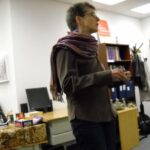In Memory Of Her: Jane Schaberg
WATER joins many friends and colleagues in mourning the death on April 17, 2012, of Dr. Jane Schaberg. Jane was Professor of Religious Studies and Women’s Studies at the University of Detroit Mercy. She was a creative and highly regarded feminist scholar whose work on Mary Magdalene is considered foundational in the field.
Jane was also a poet. Following is a poem (from a forthcoming volume of poems and essays) in which she expresses her hopes about death and her care for her beloved horse, Rappahannock.
May the legacy of her writing continue to be a blessing for all who wish to see women, including women in scripture, in the fullness of their humanity.


